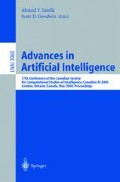Abstract
This paper discusses selection strategies for constructive search algorithms. Existing selection strategies have been based on a belief that it is better to search where solutions are more likely to be, or that it is better to search where the search space is smallest. While we give evidence for both strategies, we also show that they are likely to give modest results. We introduce the utility strategy, show that utility heuristics are superior, and that there is an optimal utility balance. We have focused this work on how the Davis-Putnam-Logeman-Loveland algorithm (“DPLL”) uses heuristics in solving satisfiability problems. Empirical results are given to justify our conclusions.
Access this chapter
Tax calculation will be finalised at checkout
Purchases are for personal use only
Preview
Unable to display preview. Download preview PDF.
References
Aspvall, B., Pass, M.F., Tarjan, R.E.: A linear time algorithm for testing the truth of certain quantified boolean formulas. Information Processing Letters 8(3), 121–123 (1979)
Bitner, J.R., Reingold, E.M.: Backtrack programming techniques. Communications of the ACM 18(11), 651–656 (1975)
Brelaz, D.: New methods to color the vertices of a graph. Communications of the ACM 22(4), 251–256 (1979)
Davis, M., Logemann, G., Loveland, D.: A machine program for theorem proving. Communications of the ACM 5, 394–397 (1962)
Davis, M., Putnam, H.: A computing procedure for quantification theory. Journal of the ACM 7(3), 201–215 (1960)
Dechter, R., Pearl, J.: Generalized best-first search strategies and the optimality of A*. Journal of the ACM 32(3), 505–536 (1985)
Dechter, R., Pearl, J.: Network-based heuristics for constraint-satisfaction problems. Artificial Intelligence 34(1), 1–38 (1988)
Dechter, R., Pearl, J.: Tree clustering for constraint networks. Artificial Intelligence 38(3), 353–366 (1989)
Franco, J., Paull, M.: Probabilistic analysis of the Davis Putnam procedure for solving the satisfiability problem. Discrete Applied Mathematics 5, 77–87 (1983)
Freuder, E.C.: A sufficient condition for backtrack-free search. Journal of the ACM 29(1), 24–32 (1982)
Haralick, R., Elliot, G.: Increasing tree search efficiency for constraintsatisfaction problems. Artificial Intelligence Journal 14(3), 263–313 (1980)
Hooker, J.N., Vinay, V.: Branching rules for satisfiability. Journal of Automated Reasoning 15, 359–383 (1995)
Hölldobler, S., Hoos, H., Strohmaier, A., Weiß, A.: The gsat/sa-familiy - relating greedy satisifability testing to simulated annealing (1994)
Irgens, M.: The Satisfiability Problem. PhD thesis, Simon Fraser University (2001) ISBN 3-89601-215-0
Jeroslow, R.G., Wang, J.: Solving propositional satisfiability problems. Annals of Mathematics and Artificial Intelligence 1, 167–187 (1990)
Joslin, D., Pollack, M.: Least cost-flow repair: A plan refinement strategy for partial order planning. In: Proceedings of the Twelfth National Conference on Artificial Intelligence (AAAI 1994), Seattle, Washington, pp. 1004–1009 (1994), American Association for Artificial Intelligence
Loveland, D.W.: Automated Theorem Proving: A Logical Basis. North-Holland Publishing Co., Amsterdam (1978)
Mitchell, D., Selman, B., Levesque, H.: Hard and easy distributions of sat problems. In: Proceedings of the Tenth National Conference on Artificial Intelligence (AAAI 1992), Menlo Park, California, July 1992, pp. 440–446 (1992), The American Association for Artificial Intelligence
Purdom, P.W.: Search rearrangement backtracking and polynomial average time. Artificial Intelligence Journal 21, 117–133 (1983)
Smith, B., Grant, S.A.: Trying harder to fail first. In: Prade, H. (ed.) Proceedings of the European Confernece on Artificial Intelligence, pp. 249–253. The European Coordinating Committee on Artificial Intelligence, John Wiley & Sons, Inc, Chichester (1998)
Tsuneto, R., Nau, D., Hendler, J.: Plan-refinement strategies and search-space size. In: Steel, S. (ed.) ECP 1997. LNCS, vol. 1348, Springer, Heidelberg (1997)
Author information
Authors and Affiliations
Editor information
Editors and Affiliations
Rights and permissions
Copyright information
© 2004 Springer-Verlag Berlin Heidelberg
About this paper
Cite this paper
Irgens, M., Havens, W.S. (2004). On Selection Strategies for the DPLL Algorithm. In: Tawfik, A.Y., Goodwin, S.D. (eds) Advances in Artificial Intelligence. Canadian AI 2004. Lecture Notes in Computer Science(), vol 3060. Springer, Berlin, Heidelberg. https://doi.org/10.1007/978-3-540-24840-8_20
Download citation
DOI: https://doi.org/10.1007/978-3-540-24840-8_20
Publisher Name: Springer, Berlin, Heidelberg
Print ISBN: 978-3-540-22004-6
Online ISBN: 978-3-540-24840-8
eBook Packages: Springer Book Archive

